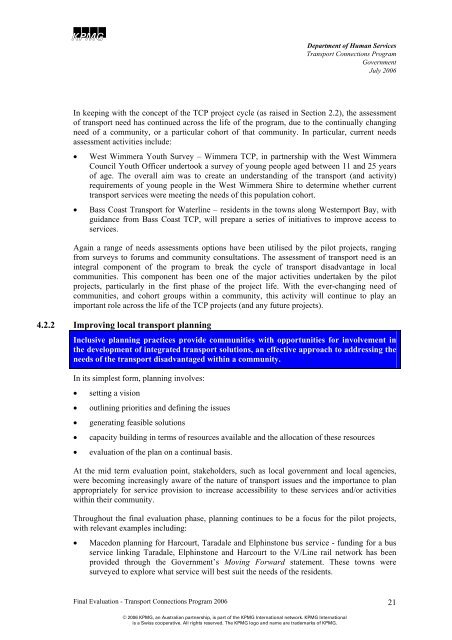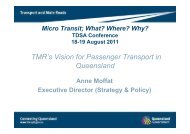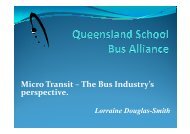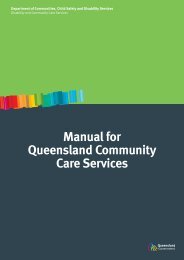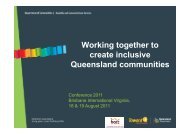Transport Connections Evaluation Report - TDSA
Transport Connections Evaluation Report - TDSA
Transport Connections Evaluation Report - TDSA
You also want an ePaper? Increase the reach of your titles
YUMPU automatically turns print PDFs into web optimized ePapers that Google loves.
ABCD<br />
Department of Human Services<br />
<strong>Transport</strong> <strong>Connections</strong> Program<br />
Government<br />
July 2006<br />
In keeping with the concept of the TCP project cycle (as raised in Section 2.2), the assessment<br />
of transport need has continued across the life of the program, due to the continually changing<br />
need of a community, or a particular cohort of that community. In particular, current needs<br />
assessment activities include:<br />
• West Wimmera Youth Survey – Wimmera TCP, in partnership with the West Wimmera<br />
Council Youth Officer undertook a survey of young people aged between 11 and 25 years<br />
of age. The overall aim was to create an understanding of the transport (and activity)<br />
requirements of young people in the West Wimmera Shire to determine whether current<br />
transport services were meeting the needs of this population cohort.<br />
• Bass Coast <strong>Transport</strong> for Waterline – residents in the towns along Westernport Bay, with<br />
guidance from Bass Coast TCP, will prepare a series of initiatives to improve access to<br />
services.<br />
Again a range of needs assessments options have been utilised by the pilot projects, ranging<br />
from surveys to forums and community consultations. The assessment of transport need is an<br />
integral component of the program to break the cycle of transport disadvantage in local<br />
communities. This component has been one of the major activities undertaken by the pilot<br />
projects, particularly in the first phase of the project life. With the ever-changing need of<br />
communities, and cohort groups within a community, this activity will continue to play an<br />
important role across the life of the TCP projects (and any future projects).<br />
4.2.2 Improving local transport planning<br />
Inclusive planning practices provide communities with opportunities for involvement in<br />
the development of integrated transport solutions, an effective approach to addressing the<br />
needs of the transport disadvantaged within a community.<br />
In its simplest form, planning involves:<br />
• setting a vision<br />
• outlining priorities and defining the issues<br />
• generating feasible solutions<br />
• capacity building in terms of resources available and the allocation of these resources<br />
• evaluation of the plan on a continual basis.<br />
At the mid term evaluation point, stakeholders, such as local government and local agencies,<br />
were becoming increasingly aware of the nature of transport issues and the importance to plan<br />
appropriately for service provision to increase accessibility to these services and/or activities<br />
within their community.<br />
Throughout the final evaluation phase, planning continues to be a focus for the pilot projects,<br />
with relevant examples including:<br />
• Macedon planning for Harcourt, Taradale and Elphinstone bus service - funding for a bus<br />
service linking Taradale, Elphinstone and Harcourt to the V/Line rail network has been<br />
provided through the Government’s Moving Forward statement. These towns were<br />
surveyed to explore what service will best suit the needs of the residents.<br />
Final <strong>Evaluation</strong> - <strong>Transport</strong> <strong>Connections</strong> Program 2006<br />
21<br />
© 2006 KPMG, an Australian partnership, is part of the KPMG International network. KPMG International<br />
is a Swiss cooperative. All rights reserved. The KPMG logo and name are trademarks of KPMG.


